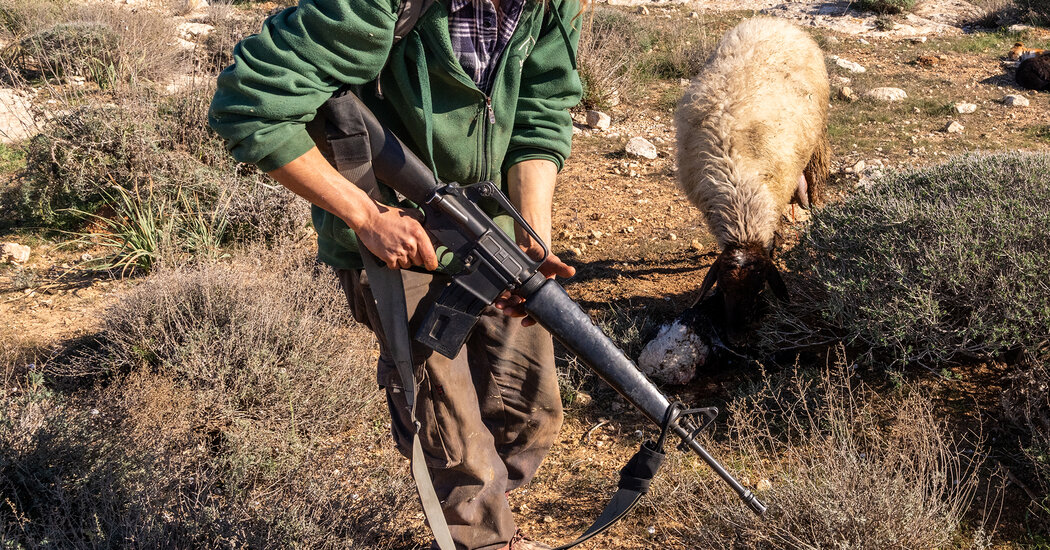- cross-posted to:
- palestine@lemm.ee
- cross-posted to:
- palestine@lemm.ee
This story is told in three parts. The first documents the unequal system of justice that grew around Jewish settlements in Gaza and the West Bank. The second shows how extremists targeted not only Palestinians but also Israeli officials trying to make peace. The third explores how this movement gained control of the state itself. Taken together, they tell the story of how a radical ideology moved from the fringes to the heart of Israeli political power.
By the end of October, it was clear that no one was going to help the villagers of Khirbet Zanuta. A tiny Palestinian community, some 150 people perched on a windswept hill in the West Bank near Hebron, it had long faced threats from the Jewish settlers who had steadily encircled it. But occasional harassment and vandalism, in the days after the Oct. 7 Hamas attack, escalated into beatings and murder threats. The villagers made appeal after appeal to the Israeli police and to the ever-present Israeli military, but their calls for protection went largely unheeded, and the attacks continued with no consequences. So one day the villagers packed what they could, loaded their families into trucks and disappeared.
. . .
Such violence over the decades in places like Khirbet Zanuta is well documented. But protecting the people who carry out that violence is the dark secret of Israeli justice. The long arc of harassment, assault and murder of Palestinians by Jewish settlers is twinned with a shadow history, one of silence, avoidance and abetment by Israeli officials. For many of those officials, it is Palestinian terrorism that most threatens Israel. But in interviews with more than 100 people — current and former officers of the Israeli military, the National Israeli Police and the Shin Bet domestic security service; high-ranking Israeli political officials, including four former prime ministers; Palestinian leaders and activists; Israeli human rights lawyers; American officials charged with supporting the Israeli-Palestinian partnership — we found a different and perhaps even more destabilizing threat. A long history of crime without punishment, many of those officials now say, threatens not only Palestinians living in the occupied territories but also the State of Israel itself.



This is the best summary I could come up with:
One wall of the clinic, leaning sideways, bore a sign saying that it had been funded by an agency of the European Union providing “humanitarian support for Palestinians at risk of forcible transfer in the West Bank.” Near the school, someone had planted the flag of Israel as another kind of announcement: This is Jewish land now.
The residual trauma of the Yom Kippur War in 1973 — when Israel was caught completely by surprise by Egyptian and Syrian forces before eventually beating back the invading armies — had shaken citizens’ belief in their leaders, and movements like Gush Emunim, directly challenging the authority of the Israeli state, had gained momentum amid Labor’s decline.
In the years that passed, he gained the attention of Shin Bet with his eliminationist views, calling Arabs “latter-day Nazis” and making a point to visit the Jewish terrorist Ami Popper in prison, where he was serving a sentence for the 1990 murder of seven Palestinians in the Tel Aviv suburb Rishon LeZion.
He was acquitted on all charges, but he has since become a fixture of extremist conspiracy theories that pose his failure to ring the alarm as evidence that the murder of the prime minister was due not to the violent rhetoric of the settler right, or the death sentences from the rabbis, or the incitement by the leaders of the opposition, but to the all-too-successful efforts of a Shin Bet agent provocateur.
A political activist who early in his career spoke openly of pushing all Arabs out of the West Bank, Maoz helped found a settlement south of Jerusalem during the 1990s and began building a professional alliance with Benjamin Netanyahu, who was then the Israeli ambassador to the United Nations and would soon go on to his first term as prime minister.
Trump, in a broader regional agenda that lined up perfectly with Netanyahu’s own plans, also hoped to scuttle the nuclear deal with Iran that Barack Obama had negotiated and broker diplomatic pacts between Israel and Arab nations that left the matter of a Palestinian state unresolved and off the table.
The original article contains 13,925 words, the summary contains 350 words. Saved 97%. I’m a bot and I’m open source!